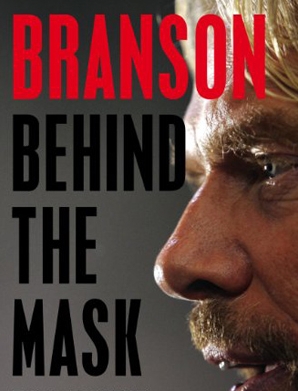Branson: Behind the Mask by Tom Bower, Faber & Faber, £20
《面具下的布蘭森》(Branson: Behind the Mask),湯姆•鮑爾(Tom Bower)著,F(xiàn)aber & Faber出版,定價(jià)20英鎊
Few entrepreneurs have grasped as clearly as Sir Richard Branson the importance of public relations in modern business. Over the past 25 years, the tycoon has assembled an empire by trading access to the likeable image that he and his Virgin brand project in return for hard assets and stakes in enterprises.
沒有幾個(gè)企業(yè)家像理查德•布蘭森爵士(Sir Richard Branson)那樣深諳公共關(guān)系對現(xiàn)代企業(yè)的重要性。過去25年間,這位大亨建立起了一個(gè)帝國,方法就是利用他本人和他的維珍(Virgin)品牌受喜愛的形象,換取實(shí)實(shí)在在的資產(chǎn)和企業(yè)中的股份。

Behind the happy-go-lucky exterior is a carefully contrived pose. This portrays Branson – in fact a vastly rich, private jet toting tax exile – as a combination of hippy and buccaneer, a scrappy outsider taking on complacent and anti-competitive giants of big business.
在布蘭森無憂無慮的外表下,隱藏著精心的算計(jì)。這使他像一個(gè)兼具嬉皮與海盜特質(zhì)的綜合體,以及一名好斗的“局外人”——常常對得意自滿、反對競爭的企業(yè)巨頭發(fā)起挑戰(zhàn)。而布蘭森事實(shí)上非常有錢,擁有私人飛機(jī),是一名“避稅流亡者”(tax exile,指為逃避高稅負(fù)而移居海外的人)。
It is an image that Tom Bower, a stern and unbending investigative hack of the old school, has over the past decade and a half set out systematically to debunk. He took his first stab in 2000 with the publication of his Branson biography – a book described by its outraged subject as “a foul, foul piece of work from the first words to the last”.
過去15年來,湯姆•鮑爾一直努力系統(tǒng)地揭穿布蘭森苦心經(jīng)營的形象。鮑爾是個(gè)頑強(qiáng)、不服輸?shù)娜耍掷吓傻恼{(diào)查作風(fēng)。2000年,他第一次出擊,出版了一本布蘭森傳記。那本書讓布蘭森大為光火,他稱該書“從頭到尾都寫得極爛”。
Since then Bower has twice honed his verdict. In 2008, he updated his opus, adding some disobliging chapters on Branson’s failed initial attempt to buy the collapsed building society Northern Rock. Now he has published a fresh volume. As the title implies, Branson: Behind the Mask continues the theme of probing the dissonance between public image and reality. But unlike its predecessors, it omits much of Branson’s business career to focus on recent events, such as his much-delayed attempt to launch a space tourism service.
后來,鮑爾又兩度增強(qiáng)了自己的論斷。2008年,他更新自己之前的作品,補(bǔ)充了一些章節(jié),毫不客氣地講述了,布蘭森最初試圖收購陷入困境的住房按揭銀行——北巖銀行(Northern Rock)時(shí),是如何遭遇失敗的。如今,鮑爾又出版了一本新書。如書名《面具下的布蘭森》所示,這本新書的主題仍然是探究布蘭森的公眾形象與實(shí)際情況的出入。但與之前的布蘭森傳記不同,這本書省略了布蘭森的大部分經(jīng)商生涯,聚焦于一些新近發(fā)生的事件,比如推遲了很久的太空旅游服務(wù)。
Somehow, after years of peddling affordable fun to the masses, Branson has ended up betting the ranch – or at least several wings and the best pasture – on a venture offering four-minute suborbital flights to celebrities and jaded millionaires willing to part with $200,000 a go.
多年來,布蘭森一直向大眾售賣價(jià)格親民的商品和服務(wù)。不知為何,布蘭森最終把身家——或至少是最精良的那部分身家——押到了一項(xiàng)提供4分鐘亞軌道飛行的太空旅游業(yè)務(wù)上。該業(yè)務(wù)的目標(biāo)客戶,是愿意為一次飛行掏20萬美元的名人以及那些玩膩了普通玩意的百萬富翁。
Branson’s capacity for reinvention is not new. It is matched only by his P T Barnum-like ability to generate excitement – generally through silly stunts – around the businesses he backs. The bigger question is why we, the public, go along with it.
布蘭森擁有高超的創(chuàng)新能力并不是新聞。他的費(fèi)尼爾司•泰勒•巴納姆(P T Barnum)式炒作能力同樣高超,他常常通過制造一些低級的噱頭,來吸引公眾對他所支持業(yè)務(wù)的注意力。更值得關(guān)注的問題是,我們的公眾為什么會(huì)買賬。
It is not as if we cannot see behind the PR mask that obsesses Bower. What does it say about us that we still buy into the image, snapping up seats on Branson’s expensive and not very glamorous trains, or, even more puzzlingly, investing in ISAs with Virgin Money (a venture Branson promises with almost comic chutzpah will deliver his objective of “a fairer distribution of wealth”)?
布蘭森的公關(guān)面具讓鮑爾耿耿于懷,而我們并非不能看穿這一面具。盡管如此,我們?nèi)匀毁I賬——購買昂貴的車票乘坐布蘭森旗下并不特別豪華的火車,甚至更奇怪的是,在維珍理財(cái)(Virgin Money)開設(shè)個(gè)人儲(chǔ)蓄賬戶(布蘭森以近乎滑稽的厚臉皮承諾稱,維珍理財(cái)將實(shí)現(xiàn)他“促進(jìn)財(cái)富公平分配”的目標(biāo))。這說明什么呢?
Bower never really explains. Much of the book is spent exploring Virgin’s financial performance, which he concludes is more rickety than its promoter would have us believe. Stretched as it is across so many ventures, money is always scarce. Too many businesses fail or do not make money. Much of the cash flow has come from businesses that, far from being “challengers”, are incumbents in highly regulated industries, such as the state-subsidy-guzzling railways.
鮑爾始終沒有真正給出一個(gè)解釋。該書大部分篇幅都在探討維珍的財(cái)務(wù)表現(xiàn),最后得出結(jié)論:維珍的財(cái)務(wù)狀況并不像布蘭森希望我們認(rèn)為的那樣穩(wěn)定,而是搖搖欲墜。雖然維珍業(yè)務(wù)跨度如此之大,但總是缺乏資金。太多業(yè)務(wù)失敗了,或并未賺錢。維珍集團(tuán)的大部分現(xiàn)金流,來自受到嚴(yán)格監(jiān)管的行業(yè),比如享有大筆國家補(bǔ)貼的鐵路業(yè),維珍在這些行業(yè)中已站穩(wěn)腳跟,遠(yuǎn)非新興的“挑戰(zhàn)者”。
One problem with Bower’s approach is that his thumb is always pressed rather too firmly on the scales. Branson is forever slightly in the wrong, whether for allowing initiatives to unravel, such as “The Project” – an ill-starred magazine app – or taking perfectly sensible commercial decisions, such as pulling out of a failing Formula One team.
鮑爾的方法有一個(gè)問題,他總是用太強(qiáng)的偏見來影響他的結(jié)論。布蘭森所做的任何事情,在鮑爾看來都做得不太對頭,無論他是推出了一個(gè)失敗的商業(yè)計(jì)劃(比如推出命運(yùn)不佳的雜志應(yīng)用“The Project”),還是做了個(gè)非常合理的商業(yè)決定(比如退出一支戰(zhàn)績每況愈下的F1車隊(duì))。
Bower questions Branson’s business acumen, criticising him for missing out on the internet and the low-cost airline revolution. But if it were so poor, Virgin would be much smaller than it is.
鮑爾質(zhì)疑布蘭森的商業(yè)智慧,批評他錯(cuò)失了兩個(gè)機(jī)會(huì)——互聯(lián)網(wǎng)浪潮和廉價(jià)航空革命。但如果布蘭森真的那樣欠缺商業(yè)智慧,維珍就不會(huì)發(fā)展成如今這樣一個(gè)龐大的帝國了。
And for a book that promises to take you behind Branson’s mask, you get little of the man himself.
此外,該書雖然承諾要揭開布蘭森的面具,但書中關(guān)于布蘭森本人的描寫少之又少。
The biggest problem about Bower’s pursuit is that he cannot ultimately run his quarry to ground. Branson now claims Virgin stands for something “beyond making money” and has started dismantling parts of the empire.
鮑爾對布蘭森的揭秘行動(dòng),最大的問題在于,他最終也未能捉住自己的“獵物”。布蘭森如今宣稱,維珍的宗旨“超越了賺錢”,并且他已開始解散維珍帝國的某些部分。
But the last chapter on his business career remains to be written. The master of self-reinvention could yet pull off another coup. I predict another book.
但布蘭森經(jīng)商生涯的最后一個(gè)章節(jié)仍有待撰寫。這位自我創(chuàng)新的大師仍可能再出奇招。我猜鮑爾還會(huì)再寫一本書。












